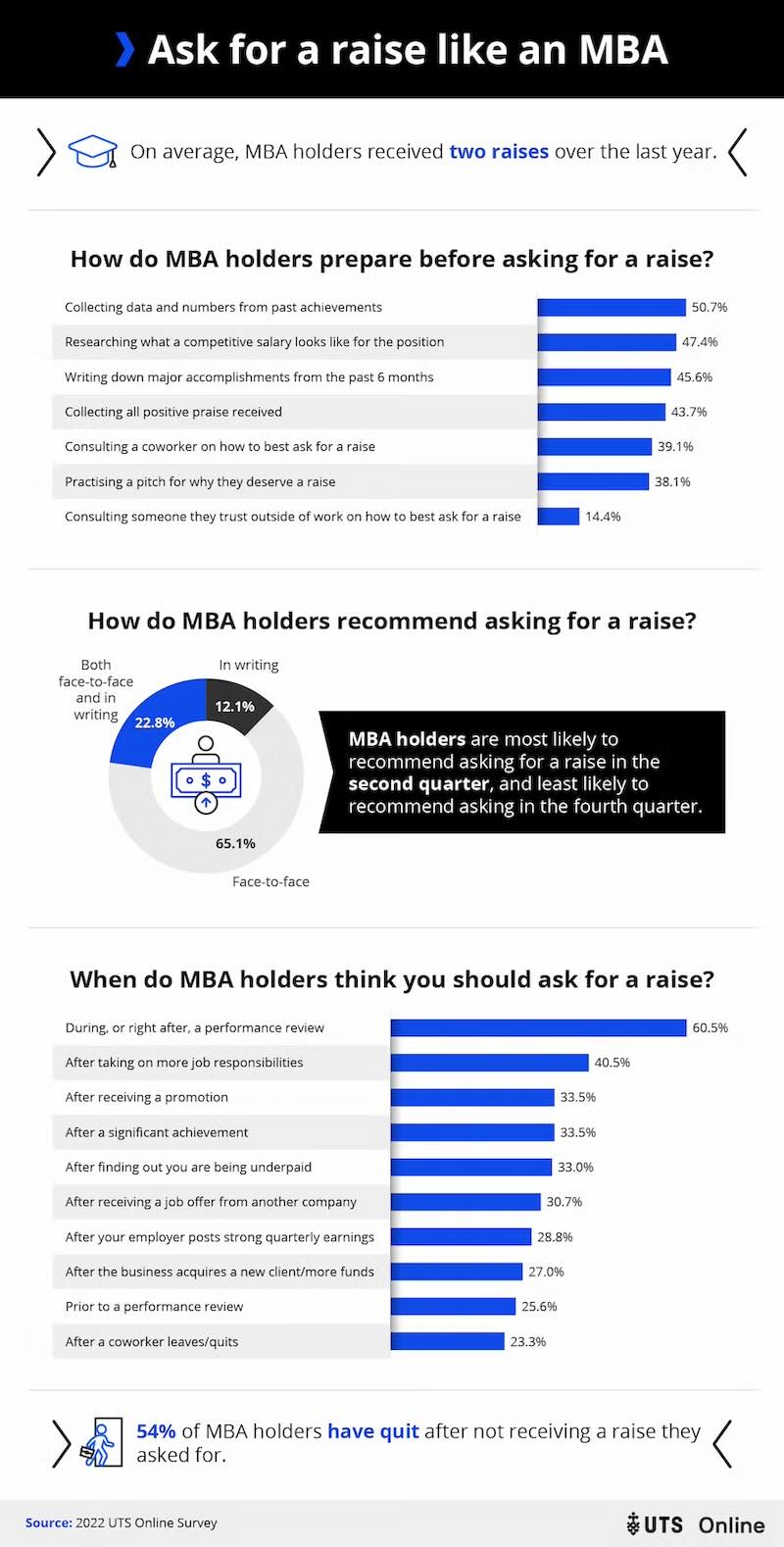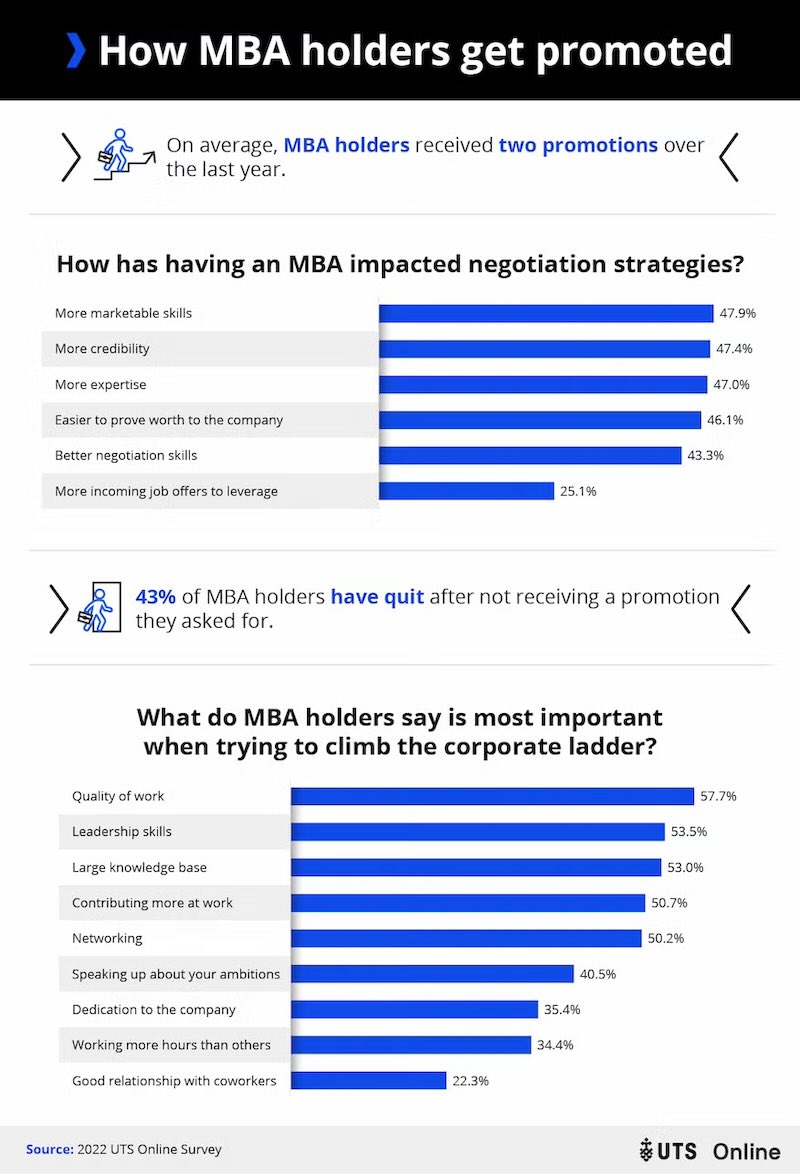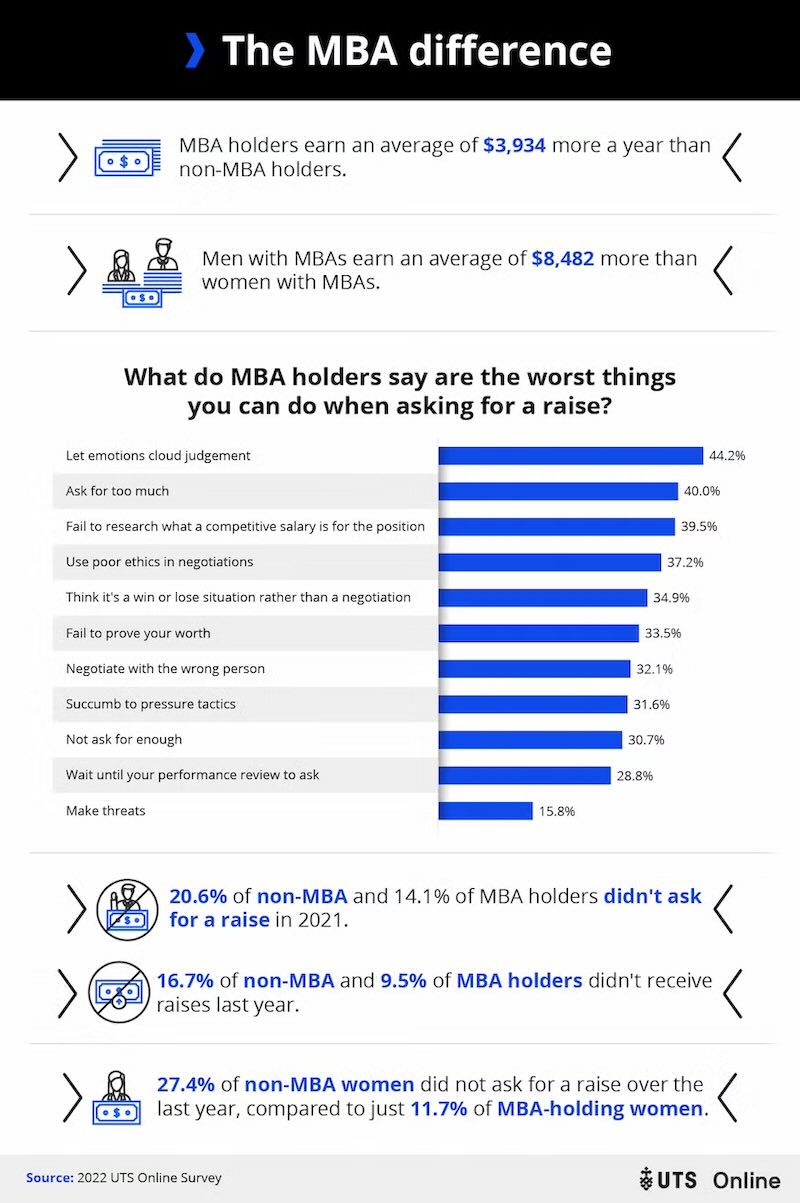Do you know how to ask for a raise like an MBA holder?


Asking for a raise can be tough. It not only requires the right amount of confidence, but also knowing when the best time is to ask and how to choose your words carefully. That’s why people who hold a Master of Business Administration (MBA) may be equipped to offer the best advice about how to effectively ask for a raise.
Key takeaways:
- 54 per cent of MBA holders have quit after not receiving a raise they asked for.
- Most MBA graduates do not recommend asking for a raise in the last three months of the year.
- When it comes to climbing the corporate ladder, professionals with an MBA say the quality of your work is most important.
What makes an MBA holder so good at business?
There are many good reasons to obtain an MBA, but the general purpose is to prepare people to advance into management positions. This degree provides strategic thinking and business skills training, laying a solid foundation for success in various workplaces. This expertise is what makes MBA holders ideal consultants to turn to for help in determining the best ways to go about one of the most challenging but most crucial decisions in career advancement: How to ask for a raise.
The MBA style of asking for a raise
Let’s look at some general advice from MBA holders, and find out how they recommend going about asking for a raise.

On average, MBA holders received two raises over the last year.
How do MBA holders prepare before asking for a raise?
- Collecting data and numbers from past achievements: 50.7%
- Researching what a competitive salary looks like for the position: 47.4
- Writing down major accomplishments from the past 6 months: 45.6%
- Collecting all positive praise received: 43.7%
- Consulting a coworker on how to best ask for a raise: 39.1%
- Practisting a pitch for why they deserve a raise: 38.1%
- Consulting someone they trust outside of work on how to best ask for a raise: 14.4%
How do MBA holders recommend asking for a raise?
- Face-to-face: 65.1%
- In writing: 12.1%
- Both face-to-face and in writing: 22.8%
MBA holders are most likely to recommend asking for a raise in the second quarter, and least likely to recommend asking in the fourth quarter.
When do MBA holders think you should ask for a raise?
- During, or right after, a performance review: 60.5%
- After taking on more job responsibilities: 40.5%
- After receiving a promotion: 33.5%
- After a significant achievement: 33.5%
- After finding out you’re being underpaid: 33.0%
- After receiving a job offer from another company 30.7%
- After your employer posts strong quarterly earnings: 28.8%
- After the business acquires a new client/more funds: 27.0%
- Prior to a performance review: 25.6%
- After a coworker leaves/quits: 23.3%
- 54% of MBA holders have quit after not receiving a raise they asked for.
Much of the work of asking for a raise happens during the preparation stage, which can include gathering background information to support your request. For more than 50 per cent of MBA holders, this means collecting data and numbers from past achievements. This information provides evidence as to why you deserve what you’re requesting.
Another crucial factor is timing – when are the best and worst times to ask for a raise? MBAs are least likely to recommend asking for a raise during the last three months of the year, which can be the most hectic part of the year for business leaders. In many industries, this last part of the year is when they start to decide if they’ll need to make budget cuts and furlough employees, so it's usually not the best time to ask for more pay.
During this process, one of the most important things to remember is your worth. If you’ve done your research and know that you should be making more based on what you’ve accomplished and what other employers might offer you, MBA holders say you should stand by it – 54 per cent of them have quit after not receiving a raise they requested. After all, based on your research, you might end up with a better job elsewhere.
How MBA holders climb the corporate ladder
Career advancement is about more than just pay raises. Our MBA respondents also explained how to negotiate for the position and duties you deserve.

How MBA holders get promoted
On average, MBA holders received two promotions over the last year.
How has having an MBA impacted negotiation strategies?
- More marketable skills: 47.9%
- More credibility: 47.4%
- More expertise 47.0%
- Easier to prove worth to the company: 46.1%
- Better negotiation skills: 43.3%
- More incoming job offers to leverage: 25.1%
43% of MBA holders have quit after not receiving a promotion they asked for.
What do MBA holders say is most important when trying to climb the corporate ladder?
- Quality of work: 57.%
- Leadership skills: 53.5%
- Large knowledge base: 53.0%
- Contributing more at work: 50.7%
- Networking: 50.2%
- Speaking up about your ambitions: 40.5%
- Dedication to the company: 35.4%
- Working more hours than others: 34.4%
- Good relationship with coworkers: 22.3%
Climbing the corporate ladder requires hard work, but having an MBA can help you work smarter, not harder. One way to add leverage to your request for a promotion is by highlighting your relevant experience. According to our respondents, getting an MBA can make this a lot easier, with nearly half saying that an MBA has given them more marketable skills.
But we gleaned some other tips from MBA holders that pertain to things you can focus on right now without pursuing a degree. The majority (more than 57 per cent) felt that the quality of your work is most important when it comes to career advancement. Contributing more at work and networking also ranked highly as the most important factor for more than 50 per cent of respondents, followed by speaking up about your professional ambitions (40 per cent).
While having friends at work has itsperks, such as improving productivity and creativity, less than a quarter of MBA holders say having a good relationship with coworkers is most important in climbing the corporate ladder. So, while attending work events is beneficial for building strong social connections with colleagues, a pro-tip from one-third of survey respondents when pushing for a raise is to spend more hours on your professional projects.
Why an MBA matters
Next, we determined if an MBA creates better career and financial outcomes, and how those outcomes differ for professional men and women.

MBA holders earn an average of $3,934 more a year than non-MBA holders.
Men with MBAs earn an average of $8,482 more than women with MBAs.
What do MBA holders say are the worst things you can do when asking for a raise?
- Let emotions cloud judgement: 44.2%
- Ask for too much: 40.0%
- Fail to research what a competitive salary is for the position: 39.5%
- Use poor ethics in negotiations: 37.2%
- Think it’s a win or lose situation rather than a negotiation: 34.9%
- Fail to prove your worth: 33.5%
- Negotiate with the wrong person: 32.1%
- Succumb to pressure tactics: 31.6%
- Not ask for enough: 30.7%
- Wait until your performance review to ask: 28.8%
- Make threats: 15.8%
26% of non-MBA and 14.1% of mba holders didn’t ask for a raise in 2021.
16.7% of non-MBA and 9.5% of MBA holders didn’t receive raises last year.
27.4% of non-MBA women did not ask for a raise over the last year, compared to just 11.7% of MBA-holding women.
It turns out that an MBA can do more for your career advancement than impressing your boss. Our survey indicated that in addition to the skills we’ve listed, having an MBA can give you more confidence to ask for a raise: Respondents without an MBA were 46 per cent more likely to not ask for a raise than those with one. You’ll always be less likely to get something if you don’t ask for it.
But confidence in asking for a raise also varied significantly based on gender. Women without an MBA were 2.3 times more likely not to ask for a raise than those with an MBA. It’s easy for women to feel like the odds are against them given the stark gender disparities in business leadership, especially in the tech industry. We also found that, on average, men with MBAs make $8,483 more than women with MBAs. No matter what’s holding you back, having the right plan for when and how to ask for that raise or promotion can only increase your chances of getting that “yes!”
Are you ready to ask for your raise?
Asking for what you deserve in your career can be scary. Our survey of successful global MBA holders shows us how an MBA can equip you with the skills to advance your career, and the confidence and mindset required to succeed. While there’s a lot you can do to improve your chances of a promotion or salary increase, it’s worthwhile to consider investing in the skills necessary to achieve the career of your dreams by getting your MBA.
Methodology
UTS Online surveyed 1,002 people about asking for a raise. All respondents were employed, and 26% of the respondents held MBAs, while the remaining 74 per cent did not. 53 per cent of the MBA respondents were male, while the remaining 47% were female. Of the non-MBAs, 44 per cent were female, and 56 per cent were male.
About UTS Online
UTS is the top-ranked Australian university under 50 years old. We focus on online postgraduate education so you can access quality, cutting-edge courses from anywhere at any time.
Fair use statement
It’s tough to find quality career advice online from real people. If you’d like to send these findings to someone who needs help asking for a raise, we encourage you to do so for noncommercial purposes. We just ask that you include a link to this page so our contributors can get credit for their work.





